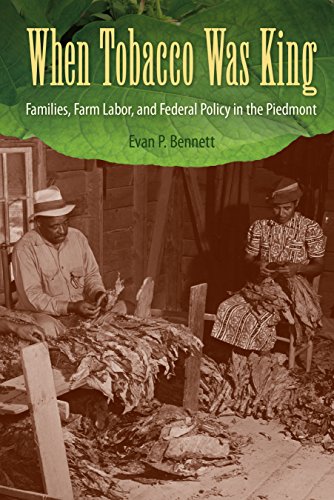All books / Book
When Tobacco Was King: Families, Farm Labor, and Federal Policy in the Piedmont

| Full title: | When Tobacco Was King: Families, Farm Labor, and Federal Policy in the Piedmont |
|---|---|
| ISBN: | 9780813060149 |
| ISBN 10: | 0813060141 |
| Authors: | Bennett, Evan P. |
| Publisher: | University Press Of Florida |
| Edition: | Illustrated |
| Num. pages: | 162 |
| Binding: | Hardcover |
| Language: | en |
| Published on: | 2014 |
Read the reviews and/or buy it on Amazon.com
Synopsis
“bennett Makes A Provocative Argument About The Importance Of Family Labor On The Tobacco Farm, The Empowerment Of Women And Children, And The Development Of A Community Culture.”—jeannie Whayne, Author Of Delta Empire: Lee Wilson And The Transformation Of Agriculture In The New South “when Tobacco Was King Reconstructs The Lives Of Farm Families In The Tobacco South, As Well As Their Work And Their Political Struggles, In Vivid, Nuanced Detail. This Brilliant Account Joins A Short List Of Indispensable Histories Dealing With Bright Leaf Tobacco.”—adrienne Monteith Petty, Author Of Standing Their Ground: Small Farmers In North Carolina Since The Civil War Tobacco Has Left An Indelible Mark On The American South, Shaping The Land And Culture Throughout The Twentieth Century. In The Last Few Decades, Advances In Technology And Shifts In Labor And Farming Policy Have Altered The Way Of Life For Tobacco Farmers: Family Farms Have Largely Been Replaced By Large-scale Operations Dependent On Hired Labor, Much Of It From Other Shores. However, The Mechanical Harvester And The H-2a Guestworker Did Not Put An End To Tobacco Culture But Rather Sent It In New Directions And Accelerated The Change That Has Always Been Part Of The Farmer's Life. In When Tobacco Was King, Evan Bennett Examines The Agriculture Of The South's Original Staple Crop In The Old Bright Belt—a Diverse Region Named After The Unique Bright, Or Flue-cured, Tobacco Variety It Spawned. He Traces The Region's History From Emancipation To The Abandonment Of Federal Crop Controls In 2004 And Highlights The Transformations Endured By Blacks And Whites, Landowners And Tenants, To Show How Tobacco Farmers Continued To Find Meaning And Community In Their Work Despite These Drastic Changes.